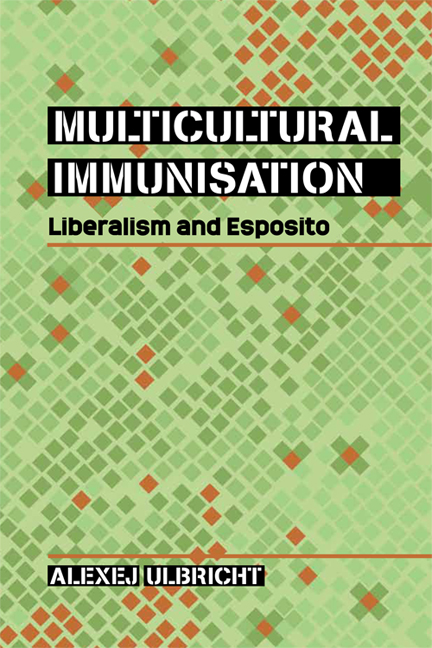Book contents
- Frontmatter
- Contents
- Acknowledgements
- 1 Introduction
- 2 Liberal Thought on Multiculturalism
- 3 Multiculturalism as a Mode of Immunising the Body of Liberalism
- 4 Liberal Multiculturalism and Rights: Citizens, Humans and Other Subjects
- 5 Disagreement and the Horizons of Consensus
- 6 Recognition: Tolerant, and Cunning
- 7 Multiculturalism Beyond Immunity
- 8 Conclusion
- Bibliography
- Index
6 - Recognition: Tolerant, and Cunning
Published online by Cambridge University Press: 05 August 2016
- Frontmatter
- Contents
- Acknowledgements
- 1 Introduction
- 2 Liberal Thought on Multiculturalism
- 3 Multiculturalism as a Mode of Immunising the Body of Liberalism
- 4 Liberal Multiculturalism and Rights: Citizens, Humans and Other Subjects
- 5 Disagreement and the Horizons of Consensus
- 6 Recognition: Tolerant, and Cunning
- 7 Multiculturalism Beyond Immunity
- 8 Conclusion
- Bibliography
- Index
Summary
In this chapter I will be looking at liberal multiculturalism from the vantage of recognition. Recognition is a central aspect of liberal multi - culturalism, and the move towards recognition is in a sense the very rationale behind according attention to groups in liberalism at all. I will be arguing that while recognition is meant to be the mode of incorpora - ting groups in the multicultural polity, it comes with its own provisos and pitfalls and in fact acts as a process of immunisation. In order to do this, I will be engaging primarily with the work of Elisabeth Povinelli and with what she calls the ‘cunning of recognition’. This term refers to a series of subterranean operations which accompany recognition and which put the subject of recognition in a difficult if not impossible position, while strengthening the liberal polity at the same time.
In terms of liberal theorists of multiculturalism, I will be concerned in this chapter with Charles Taylor, whose essay ‘The Politics of Recog - nition’ was one of the most influential early texts in the literature on multiculturalism. Again, I focus on Taylor not because he is the only theorist for whom recognition is important (in fact, as I mentioned above, some form of recognition is arguably the motivation in all theories of multiculturalism), nor because recognition is all that is important in his work. Rather, it is because his treatment on recognition has been highly influential and functions very well in illustrating a particular strand in liberal multiculturalist thinking.
In the second half of the chapter I will be linking liberal ideas of recognition with liberal discourses of tolerance. Both recognition and tolerance discourse have as a central component the proviso that no protection, respect or recognition should be given to cultural practices that are abhorrent. It is this proviso, and the fact that definitional hegemony over abhorrence lies with liberals, that says much about the Other-hostility of liberal approaches to difference. In looking at tolerance, I will be engaging mainly with Wendy Brown's work on how liberal tolerance discourse acts as a process of governmentality. I will be arguing that tolerance and recognition operate in very similar ways, and can both be best understood as liberal processes of immunisation.
- Type
- Chapter
- Information
- Multicultural ImmunisationLiberalism and Esposito, pp. 115 - 141Publisher: Edinburgh University PressPrint publication year: 2014



